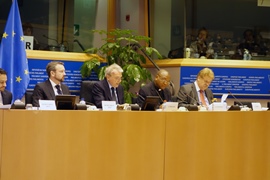|
Nigerian Bishops: Country threatened by "the twin monsters of corruption and insecurity." ACN-USA News “Growing corruption and religious violence jeopardize the West African country of Nigeria”. This stark warning by Cardinal John Onaiyekan, Archbishop of Abuja, was given during his recent presentation to the Foreign Affairs Committee of the European Parliament in Brussels. Cardinal Onaiyekan was accompanied by Bishop Matthew Hassan Kukah of Sokoto. Coordinated by the international Catholic charity Aid to the Church in Need, the two church leaders presented the most urgent challenges facing Nigeria to the European Union decision makers to try and help them understand the realities on the ground in one of the three priority countries of the EU in sub-Saharan Africa. The two others are South Africa and Kenya. In their discussions with the Committee and other Members of Parliament, as well as with the executive power of the EU (the European Commission) and the political representatives (the Council of the 27 Member States), Cardinal Onaiyekan and Bishop Kukah addressed two fundamental concerns, what they referred to as “the twin monsters of corruption and insecurity.” According to the Church leaders, with a GDP of $244 billion as well as a recipient of generous international aid, Nigeria is not a poor country, but the corruption and mismanagement is such that precious little reaches the population. “This has generated extremely high levels of mistrust among the population, which feeds into the other daily menace: insecurity,” explained Cardinal Onaiyekan. Where the government services fail, the Catholic Church steps in to provide relief services, operating numerous schools, hospitals, legal aid centers and other basic services in Nigeria’s most impoverished regions. “The Catholic Church is concerned about the well-being of all Nigerians, not only those baptized in our churches. We are 170 million Nigerians, roughly half are Christians from different denominations and half are Muslims, also of different groups. Catholics are still the largest single-faith group in the country, so we have considerable influence and responsibility,” stated Cardinal Onaiyekan. Bishop Kukah of the Sokoto diocese (in northwestern Nigeria) where the Catholics are a very small minority, said that the socio-economic indicators of health, education and income of Northern Nigeria are among the worst in the entire Sub-Saharan Africa. “The region has a Muslim majority in power. The way they spend federal funding follows their own priorities and the concept of education and public health is not the same as that of UNESCO. This is the region where the group Boko Haram was created.” Cardinal Onaiyekan added that the combination of poverty, mistrust and a huge inflow of arms from Libya have made the tension grow exponentially. “Very often the criminals are better armed than the Nigerian security forces.” |
|
|

